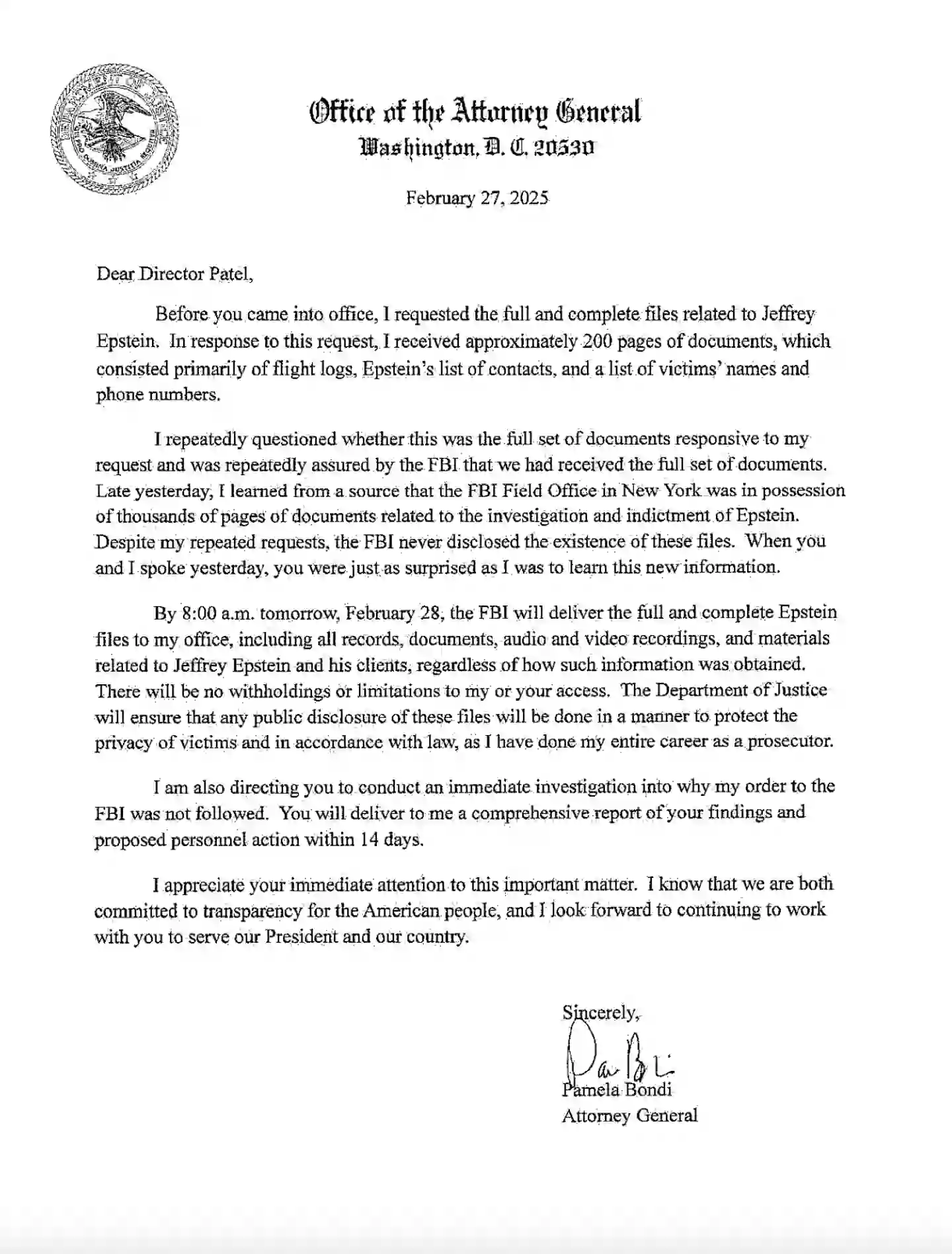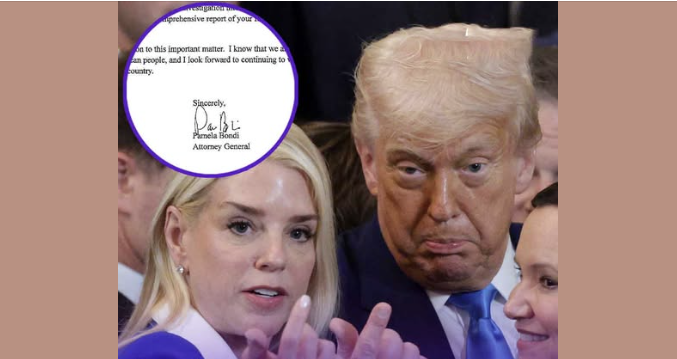Explosive Epstein Letter Exposes Internal Rift, Undermines Trump’s Denial of Documents
In a stunning development that further complicates the long-running Jeffrey Epstein saga, a leaked February 2025 letter from U.S. Attorney General Pam Bondi to FBI Director Kash Patel confirms the existence of a vast trove of previously undisclosed files tied to Epstein’s sex trafficking network. This revelation directly contradicts recent claims by Donald Trump, who dismissed the existence of any official government documents related to Epstein’s crimes.
The letter—obtained by several news outlets and authenticated by the Department of Justice—shines a harsh light on the internal dysfunction within federal law enforcement, exposing what some officials now describe as a cover-up. It also adds fuel to ongoing speculation and political debate about who Epstein’s clients were and what the U.S. government may be hiding.
The Letter: A Bombshell Inside the Bureaucracy
Dated February 27, 2025, Bondi’s letter begins routinely, acknowledging her prior receipt of approximately 200 pages of Epstein-related material. These included well-known flight logs, a list of Epstein’s high-profile contacts, and names of identified victims. The materials matched what had been made available in prior limited DOJ releases.
But what followed in the letter’s second half shattered expectations.
Just a day earlier, Bondi wrote, she had been informed that the FBI’s New York Field Office still retained “thousands of pages of Epstein-related documents” that had never been disclosed to her office or made public. These additional materials reportedly include not just paperwork but video and audio recordings, surveillance files, and internal notes from earlier investigations dating back to the early 2000s.
In response, Bondi issued a clear and urgent directive: she demanded immediate delivery of all materials by 8:00 a.m. the next day—February 28—and instructed Patel to launch an internal investigation into why the files were withheld. She further ordered him to produce a full report with personnel recommendations within two weeks, citing concerns about transparency and the rights of victims.
Trump’s Denial and the New Contradiction
Only weeks before this letter became public, Donald Trump had publicly denied that any meaningful Epstein documents existed, claiming that the issue was being kept alive by “conspiracy theorists” and “media hysteria.” He called continued interest in the Epstein files “unbelievable” and repeated a now-familiar refrain: that he had nothing to do with Epstein and had never seen or heard of such documents.
Trump’s dismissals are not new. Though his connection to Epstein has long been a topic of public speculation, there has never been confirmed evidence tying him to Epstein’s criminal behavior. However, photographs and flight logs show they were socially connected in the 1990s and early 2000s.
Still, this newly surfaced letter undermines Trump’s recent statements by proving that official files not only exist but were also withheld by a federal agency under his administration’s influence until early 2025.
What’s in the Files?
So far, only a fraction of the Epstein files has been made public. In February, the DOJ released a heavily redacted “first wave” of documents, including previously leaked flight logs, court depositions, and contact lists. These documents rehashed what the public already knew: Epstein flew dozens of celebrities, politicians, and business elites on his private jets and hosted parties attended by the rich and powerful.
But Bondi’s letter confirms there is much more—and it remains unseen by the public. The mention of recordings is particularly explosive, given longstanding rumors that Epstein used surveillance to potentially blackmail associates or document illegal activity. If such tapes exist, they could drastically alter the public and legal understanding of who was involved in Epstein’s criminal enterprise.
Bondi’s letter also raises questions about whether any individuals currently or formerly in government had access to or knowledge of these suppressed documents—and why they weren’t shared with victims’ attorneys or congressional investigators sooner.
Political Fallout and DOJ Division
The letter’s emergence has exposed a deepening schism within the Justice Department. Bondi, a Trump appointee and longtime ally of the former president, appears to be distancing herself from any perception of complicity. Her decision to publicly document her concern and issue a paper trail to Kash Patel, another Trump loyalist, signals internal distrust.
Kash Patel, best known for his work with Trump’s national security team and public alignment with far-right media, has not publicly responded to the letter’s contents. However, DOJ sources confirmed that Bondi’s memo was forwarded to internal affairs investigators within days of receipt.
The House Oversight Committee, led by Democrats, has now announced hearings to examine the matter. They intend to subpoena Bondi, Patel, and Deputy FBI Director Dan Bongino to explain how such a large volume of Epstein material was not disclosed until 2025—and what was done with it during the years it remained hidden.
No “Client List” — But A Growing Clamor for Truth
Despite widespread speculation, Bondi’s letter does not mention any so-called “client list”—a phrase that has become a flashpoint in the Epstein saga. DOJ officials continue to maintain that no definitive list of criminal clients exists, at least not in the format the public imagines. Many contacts in Epstein’s files are thought to be social, financial, or tangential, not necessarily criminally implicated.
Still, the delay in disclosing files, especially those with potential video or audio evidence, has fueled accusations of a slow-rolling cover-up—perhaps one designed to shield powerful individuals across political lines.
Victims’ Advocates: Vindicated, But Still Waiting
For the survivors of Epstein’s trafficking network, the letter offers both vindication and fresh frustration. Many have long believed that federal agencies were not fully honest about what was collected during years of investigations. Bondi’s admission confirms their worst fears: vital materials were being held back, possibly compromising justice and accountability.
“It’s an insult,” said Sarah Ransome, a known Epstein survivor. “We were told everything had been turned over. Now we find out that thousands of pages were sitting in an office all this time? What else are they hiding?”
Legal experts warn that any criminal implications from these hidden files may now be harder to pursue due to the passage of time and statutes of limitation—though civil litigation and international cooperation could still play a role.
Conclusion: A Reckoning Still to Come
The February 2025 letter from Pam Bondi has shifted the narrative surrounding Jeffrey Epstein’s legacy. No longer can it be claimed that there are no government records. No longer can denials of knowledge go unchallenged.
Whether or not Trump is personally implicated, his public denials have been undermined. And as Congress, the DOJ, and the public begin to demand answers, the Epstein scandal—once seemingly closed with his death in 2019—may be far from over.
If nothing else, the letter proves one thing beyond doubt: the truth has been sitting in a locked drawer all along—and now, the door has finally creaked open.




